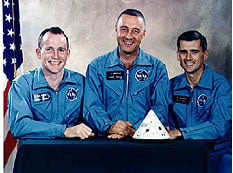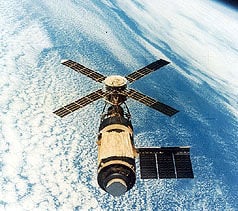
1967 — 1980
 |
| Apollo 1 astronauts Ed White, Gus Grissom, and Roger Chaffee (NASA) |
First Deaths in Space
January 27, 1967
During a test on the launchpad, a fire kills Apollo 1 astronauts Virgil "Gus" Grissom, Ed White, and Roger Chaffee. Then, on April 24, 1967, the Soviet craft Soyuz 2 crashes on re-entry, killing Vladimir Komarov — the first cosmonaut to die during flight.
 |
| Apollo 11's Lunar Module on the moon's surface (NASA) |
First Moon Landing
July 20, 1969
During the flight of Apollo 11, Neil Armstrong becomes the first man to walk on the moon. Buzz Aldrin is the second. Armstrong says, "That's one small step for man, one giant leap for mankind." Millions of people watch live on television.
 |
| The Apollo 13 capsule after splashdown (NASA) |
First Space Rescue
April 13, 1970
An oxygen tank explodes aboard Apollo 13. With help from Mission Control, the crew — Jim Lovell, Fred Haise, and John Swigert — return to Earth safely four days later.
First Space Station
April 19, 1971
The Soviets launch Salyut 1, the first orbiting space station. Salyut 1's original crew dies during re-entry on June 30, 1971. Georgi Bobroeolski, Vladislav Volkov, and Victor Patsayev had spent a record 23 days in space.
 |
| Skylab in orbit (NASA) |
First American Space Station
May 14, 1973
The first American space station, Skylab, is damaged during launch. The first of three crews arrive 11 days later for a 28-day stay. They make in-orbit repairs and set records for time spent in space.
 |
| Astronaut Donald Slayton, cosmonaut Alexei Leonov, and astronaut Thomas Stafford during the docking of Apollo-Soyuz (NASA) |
First International Docking in Space
July 17, 1975
American and Soviet spacecraft dock together in space in a show of peaceful cooperation during the Apollo-Soyuz mission.
First Mars Landing
July 20, 1976
Viking 1, an unmanned scientific probe controlled by scientists on Earth, transmits the first pictures from the surface of Mars. Viking 2 arrived in September 1976.


